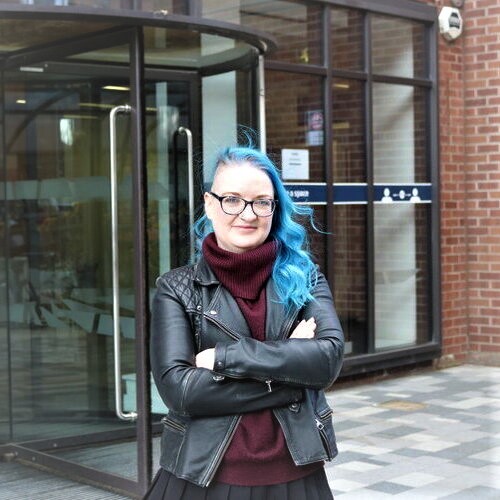We recently caught up with Lynsey Mitchell who has just joined the School of Law as an early career researcher and lecturer in Law. No stranger to Strathclyde, Lynsey completed her law degree and PhD here at Strathclyde, before making her return as one of our newest Law academics.
Tell us a little bit about your career so far...
I am an early career researcher and lecturer in law. I joined Strathclyde Law School in January 2022. Previously I was a lecturer at Abertay University (2018-2022) where I taught Gender, Sexuality and the Law; EU law; Law of Evidence and Human Rights Law. Prior to that I was a lecturer at Leeds Beckett University (2017-2018) where I taught on various Human Rights Law modules.
What has been the most memorable moment of your career so far?
In 2019 I organised a conference on Law, Power, and Justice in Game of Thrones with a colleague at Durham University. We were able to host the conference in the Senate Suite of Durham Castle. Not many legal conferences take place in a setting that can stand in for Winterfell!
What sparked your interest in your area of expertise?
I became interested in human rights as an undergraduate student. I volunteered with a variety of human rights organisations in Scotland such as the Scottish Refugee Council and Citizens Advice Scotland where I worked with vulnerable women, many of whom had fled conflict and violence.
What is your role within the school?
I am the director of Post-Graduate Research. I oversee the recruitment of new research students and advise anyone interested in coming to Strathclyde to pursue a PhD or a research masters. I am also a member of the Centre for the Study of Human Rights Law and I teach across a variety of modules.
What current trends do you see influencing your field?
The #MeToo movement has brought discussions on feminism and women’s rights to the forefront of public debate. The Covid-19 lockdowns have meant changes to how women and pregnant people access abortion care and wider sexual health services. This has triggered discussions on the boundaries of human rights law and how law can better understand and respond to the issues that women face in contemporary society.
Tell us a little bit about any research you are currently involved in...
My research straddles international human rights law, women’s rights, reproductive rights, feminist legal theory, gender and sexuality, and law and literature. I am interested in women’s rights and how these fit within wider understandings of human rights law.
My current funded research project examines how we understand reproductive rights within wider human rights law by exploring how reproductive rights are taught in law schools. This project is funded by the Society of Legal Scholars.
What initially attracted you to the University of Strathclyde?
I completed my law degree at Strathclyde and then returned to do my PhD. I loved studying at Strathclyde and was lucky enough to work as a tutor throughout my PhD, so I got to know most of the staff and students. The Law School is a great department so I was really happy to return.
Find out more about Lynsey's research here:
Law’s Invisible Women | Amicus Curiae (sas.ac.uk)
Reading narratives of privilege and paternalism: the limited utility of human rights law on the journey to reform Northern Irish abortion law | Northern Ireland Legal Quarterly (qub.ac.uk)
Re-affirming and rejecting the rescue narrative as an impetus for war: to war for a woman in a Song of Ice and Fire — University of Strathclyde
